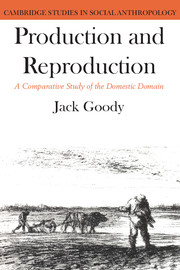Book contents
- Frontmatter
- Contents
- Tables
- Figures
- Preface
- Acknowledgements
- 1 The evolution of the domestic economy: the hoe and the plough
- 2 The theory, the variables and a test
- 3 Making causal inferences
- 4 Farming, labour and sex
- 5 Concubines and co-wives: the structure of roles in Africa and Eurasia
- 6 Adoption in cross-cultural perspective
- 7 Strategies of heirship
- 8 Class and marriage
- 9 Retrospect
- Appendix 1 Tables
- Appendix 2 The probability of family distributions
- Notes
- References
- Index
9 - Retrospect
Published online by Cambridge University Press: 05 June 2012
- Frontmatter
- Contents
- Tables
- Figures
- Preface
- Acknowledgements
- 1 The evolution of the domestic economy: the hoe and the plough
- 2 The theory, the variables and a test
- 3 Making causal inferences
- 4 Farming, labour and sex
- 5 Concubines and co-wives: the structure of roles in Africa and Eurasia
- 6 Adoption in cross-cultural perspective
- 7 Strategies of heirship
- 8 Class and marriage
- 9 Retrospect
- Appendix 1 Tables
- Appendix 2 The probability of family distributions
- Notes
- References
- Index
Summary
It is pointless to waste time on further conclusions for three reasons. Firstly, at several stages in the book, I have tried briefly to summarise the points I was making. Secondly, such an undertaking has already involved summarising summaries of summaries; scholars of particular societies will want to qualify much of what I have said, and rightly so from an ethnographic standpoint, for the view from the bird's eye does an injustice to the particular richness of life on the ground. But the advance of knowledge involves a perpetual dialectic between general and particular. Thirdly, it would be wrong to tie up too closely what needs to develop more widely: the comparative study of human society, in its full historical, geographical and morphological perspective, has hardly begun to be systematised. The future development of the storage capacity of computers and of the power of analytic programs will increase our ability to handle large quantities of written material for comparative purposes. Despite the inaccuracies of ethnographers, the inefficiency of anthropologists and the woolliness of sociologists, our powers of analysis, our abilities to test our ideas, will be advanced by the increasing sophistication of the technology we create and command.
Not that this is everything. And even without these improved facilities there is plenty of room for the refining and elaboration of general hypotheses. I have tried to sketch out some broad differences in the structure of roles, as category systems and as behavioural systems.
- Type
- Chapter
- Information
- Production and ReproductionA Comparative Study of the Domestic Domain, pp. 115 - 120Publisher: Cambridge University PressPrint publication year: 1977

